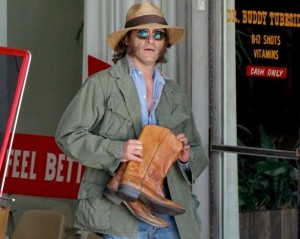Paul Thomas Anderson’s Inherent Vices?
Paul Thomas Anderson’s forthcoming film, an adaptation of Thomas Pynchon’s Inherent Vice (2009), is quickly stockpiling quite the all-star cast. Rumors of Sean Penn, who was originally slated for the part of Dean Trumbell (eventually played by Philip Seymour Hoffman) in Punch Drunk Love (2002), add to an already impressive line-up that includes lead Joaquin Phoenix, Benecio Del Toro, Josh Brolin, Jena Malone, Martin Short, Owen Wilson and Reese Witherspoon (originally attached to The Master [2012]). The anticipation is quickly building, and it seems as though—perhaps even inexplicably—Anderson’s authorship has finally reclaimed a certain industry viability that was lost in the indulgences of the Magnolia era (1999), as well as through the long pre-production histories of both There Will Be Blood (2007) and The Master. It’s an exciting time for fans of the director, but what final product will emerge out of this is still to be determined—especially as we see Anderson to some degree returning to his own inherent vices.
Having begun to develop a reputation as a more deliberate filmmaker (previously making only three films in thirteen years), the quick turnaround from 2012’s The Master is impressive—though unsurprising. Anderson worked on both scripts largely simultaneously. Committed to a somewhat different version of The Master with Jeremy Renner and Witherspoon, Anderson dropped that during rehearsals and went to Inherent Vice—at one time with Robert Downey, Jr., attached. Yet just as it appeared the latter project might gain traction, Anderson went back to The Master, finally completing the film we know today. It is thus understandable that production on Inherent Vice could move quickly—though its more surprising that he found funding so easily, especially with a major studio (Warner Bros.) backing the project.
Although Anderson is a critical darling, his movies have never made money. Boogie Nights (1997) did better on home video than in theatres. Magnolia and There Will Be Blood barely broke even, despite generally strong critical support. Indeed, partly why There Will Be Blood took five years to get made (Daniel Day-Lewis committed years before it went into production) was because the filmmakers couldn’t convince financiers it had any commercial viability—especially for what was, on paper, a pricey historical epic. Anderson only got the film made once his agent, John Lesher, took over as head of Paramount Vantage in 2006. So Warner Bros.’ support of such a commercially-suspect project—an Anderson adaptation of a Pynchon novel—is impressive, especially on the heels of The Master’s poor box office and mixed critical response.
As with casting Magnolia on the heels of Boogie Nights, Anderson is taking advantage of the hype to grab numerous stars. Yet this itself should be a cautionary tale—part of why Magnolia became such a bloated epic (unlike the smaller, more intimate narrative originally envisioned) was because Anderson focused on writing parts for all his friends. Granted, Inherent Vice is a more straightforward genre project on paper, which shouldn’t lend itself to the scattered nature of an aimless epic. Yet, the first cut of Anderson’s debut, Hard Eight (1996)—also essentially a noir film—was a meandering two-and-a-half hour character epic, very different from the taut 90 minute genre exercise audiences know today.
However, the discipline of adaptation may prove to reign in the worst excesses and self-indulgence that marred the earliest parts of Anderson’s career. In the late 1990s, Anderson unsuccessfully attempted to adapt Russell Banks’ Rules of the Bone (1995) for director Jonathan Demme. By his own admission, Anderson struggled to work within the voice of another artist and finally gave up. Meanwhile, the screenwriter had an easier time a decade later working with Upton Sinclair’s Oil (1927) to produce There Will Be Blood. Yet, partly what made that generally loose adaptation remarkable was not only Day-Lewis’s iconic performance, but also Anderson’s recent tendency to strip his stories down to one or two central characters instead of the massive Altmanesque ensembles that structured his two late `90s films with New Line—Boogie Nights and Magnolia. Anderson’s most recent films wisely centered largely on a single (irrationally angry) protagonist—Barry Egan (Adam Sandler) in Punch-Drunk Love, Daniel Plainview in There Will Be Blood, and Freddie Quells (Phoenix) in The Master.
So how will Anderson’s turn back to large ensembles ultimately pan out, especially coupled with his noted loyalty to actor-friends? It’s interesting that Anderson was quick to reunite with Phoenix, given that for a while he challenged himself to work with different actors, after largely reusing a lot of the same names in the 1990s (Philip Baker Hall, John C. Reilly, Melora Walters, Hoffman). Inherent Vice’s remarkable casting news could prove to be a double-edged sword. The book itself certainly fits Anderson’s thematic interests—from Magnolia to The Master—his films often deal with existential crises amidst the hollow prosperity of postwar American commodity culture. How it will translate to the screen, though, is anyone’s guess.




